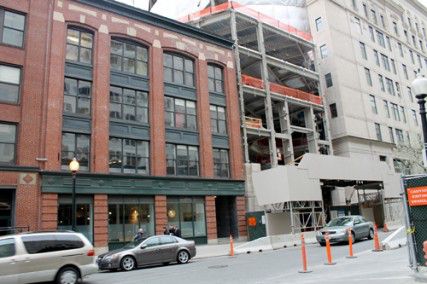
Boston University College of Arts and Sciences sophomore Rachel Franklin said when she studied abroad in fall 2011 in Grenoble, France, she stayed in many hostels while touring countries in Europe.
But Franklin said she did not know people stayed in hostels in the U.S. as well.
“Everywhere I went I stayed in hostels,” Franklin said, listing the six separate European cities she visited. “I haven’t ever stayed in a true hostel in the U.S. Do people do that? I’ve never heard of them here.”
Boston alone hosts about 10 hostels, many of them clustered within a block of each other in the Back Bay area west of Berklee College of Music.
They offer rates generally lower-than-average hotel prices and provide beds to patrons in large common rooms or in smaller, private rooms.
Hostels keep prices low – about $30 to $100 a night – by clustering groups of travelers together and by stripping rooms of televisions, cable service, phones and extraneous furniture hotels offer, said Bria Schecker, director of events and media at hostel 40Berkeley.
While hostels often appeal to younger travelers, she said 40Berkeley, in the South End, has hosted a large demographic of visitors between the ages of 18 and 35.
Schecker said she has seen every type of person imaginable walk through the door, including professionals, leisure travelers, families and retirees.
“The U.S. hostel industry in general is very new,” she said. “A lot of Americans don’t even know what a hostel is.”
The hostel on Berkeley Street includes a main sitting room next to a space filled with rocking chairs that face the windows overlooking the street. The hostel also has a movie room, game room and full cafeteria.
While the 40Berkeley hostel provides many different types of rooms ranging from singles, triples, quads, family rooms and suites, other hostels such as the YMCA Hostel on Huntington Avenue have limited rooms specific to certain people.
YMCA hostel personnel Sandra Overshown said during the winter months of the year, the hostel opens for men only and currently has beds in six rooms. During the spring and summer, rooms are available to both men and women with shared bathrooms.
“We’re the only YMCA in the greater Boston area with rooms open,” Overshown said.
Rooms at the YMCA range from $50 for a single per night to $100 for a quad per night. The maximum stay at the YMCA is 10 days – not uncommon for a hostel.
Hostelling International Boston began construction 15 months ago on building a new location on Stuart Street that will open June 7. HI-Boston currently manages a hostel on Hemenway Street, which will close once the new hostel is opened.
Executive Director Deborah Ruhe said the $43 million project funded by state and historical tax credit investment programs was planned years ago to create a hostel with more rooms and modern amenities.
“We could not really meet the demands. Student and youth travel is increasing rapidly and that hostel on Hemenway Street has been full all the time,” Ruhe said. “It didn’t have AC, it didn’t have an elevator, so in the summer times for the past 12 years or so, we’ve been renting dormitories from BU.”
Ruhe said the requests for stays in the hostel increase during the period from late spring until November when travel is more frequent.
“We know in the summer we have a demand that is sometimes as great as 500 people a night wanting to be in a hostel in Boston,” she said. “The new hostel will have 480 beds, where the one on Hemenway could only accommodate 205 [people].”
Ruhe and Schecker said both 40Berkeley and the new Stuart Street hostel have security measures in place to limit crime and ensure the safety of peoples’ possessions ranging from locks on personal drawers, check-in desks, security alarms and late-night policies.
Schecker said 40Berkeley locks its door after 10 p.m. and guests must buzz in and show a room key to a security guard.
Since hostels attract people because of their low costs, competing hotels in the nearby areas with slightly higher rates are available to people traveling on bigger budgets.
Gretchen Chauncey, general manager of The Chandler Inn Hotel, said it is a good thing that people have different options for where they want to stay depending on their needs.
“I don’t think it impacts [us] in a negative way to have hostels – I think it’s a positive,” Chauncey said. “Every traveler has unique needs. Some people, their primary need is cost effectiveness – it could be location or availability. I think it is fabulous that there are all different options out there for all different price ranges.”























































































































hostels in rome • Apr 7, 2012 at 8:36 am
Thank-you for this article, I love hostels!